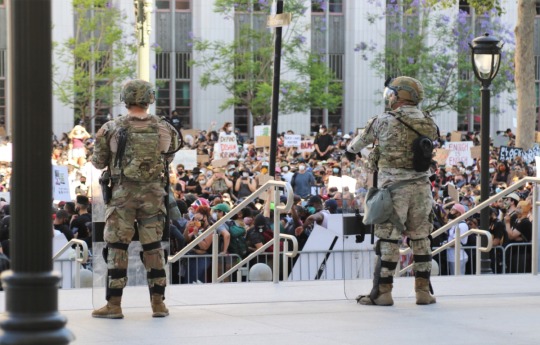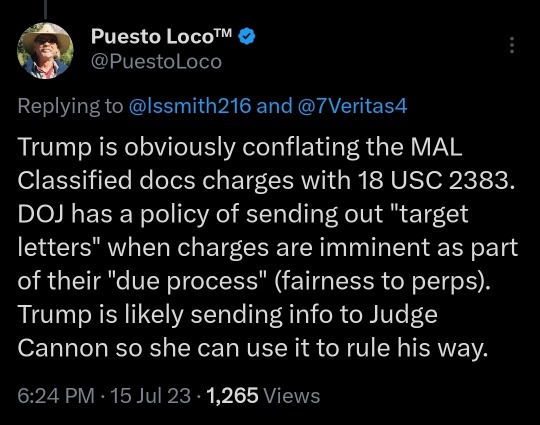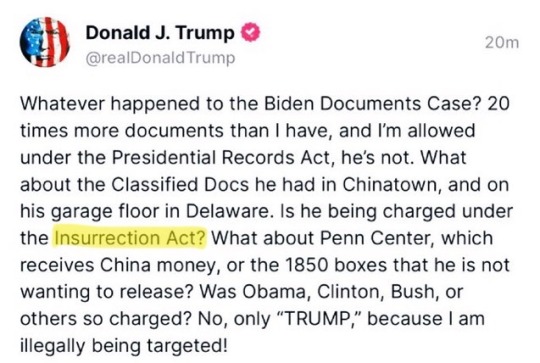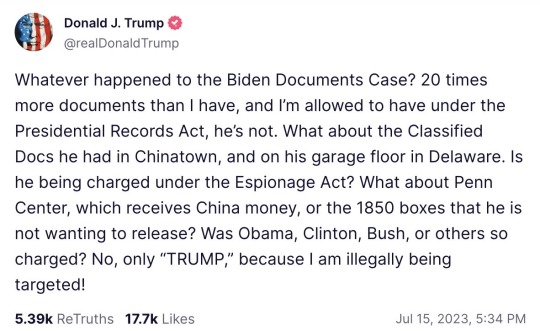#Insurrection Act
Text

Trump depends on disinformation. His base is so gullible for white leadership that they will believe whatever word salad bullshit that dribbles out of this traitor's mouth.
426 notes
·
View notes
Text
The article doesn’t mention it by name but Project 2025 calls for troops to be deployed in Democratic cities (virtually all the big cities) to prevent protests, resistance of any kind, mass round-ups of immigrants (or minorities), or even to block voting. A future president Drumpf could use the military at his whim against domestic rivals or political enemies.
🤬
#republican assholes#traitor trump#crooked donald#insurrection act#traitor#republican values#resist#maga morons#never trump
101 notes
·
View notes
Text


#Liz cheney#twitter#woc#news#fox news#democrats#republicans#donald trump#politics#insurrection act#jan 6 insurrection#january sixth#lbqt#gay marrriage
547 notes
·
View notes
Text
The original articles are behind a paywall. This is a good summary.
tl;dr: "The stakes in the 2024 race couldn’t be much more obvious."
Update: (x). It's even worse than that.
#trump#enemies list#weaponization of the government#increase the president's authority#government by whim#no more separation of powers#this is called a dictatorship#please register#please vote#martial law#insurrection act
11 notes
·
View notes
Text
12/6/23: Colorado Supreme Court appeal. I know it looks like a rerun, but it's not.
2 notes
·
View notes
Text
Trump and allies plot revenge, Justice Department control in a second term | The Washington Post
ADVISERS HAVE ALSO DISCUSSED DEPLOYING THE MILITARY TO QUELL POTENTIAL UNREST ON INAUGURATION DAY. CRITICS HAVE CALLED THE IDEAS UNDER CONSIDERATION DANGEROUS AND UNCONSTITUTIONAL.
By Isaac Arnsdorf, Josh Dawsey and Devlin Barrett
Donald Trump and his allies have begun mapping out specific plans for using the federal government to punish critics and opponents should he win a second term, with the former president naming individuals he wants to investigate or prosecute and his associates drafting plans to potentially invoke the Insurrection Act on his first day in office to allow him to deploy the military against civil demonstrations.
In private, Trump has told advisers and friends in recent months that he wants the Justice Department to investigate onetime officials and allies who have become critical of his time in office, including his former chief of staff, John F. Kelly, and former Attorney General William P. Barr, as well as his ex-attorney Ty Cobb and former Joint Chiefs of Staff chairman Gen. Mark A. Milley, according to people who have talked to him, who, like others, spoke on the condition of anonymity to describe private conversations. Trump has also talked of prosecuting officials at the FBI and Justice Department, a person familiar with the matter said.
In public, Trump has vowed to appoint a special prosecutor to “go after” President Biden and his family. The former president has frequently made corruption accusations against them that are not supported by available evidence.
To facilitate Trump’s ability to direct Justice Department actions, his associates have been drafting plans to dispense with 50 years of policy and practice intended to shield criminal prosecutions from political considerations. Critics have called such ideas dangerous and unconstitutional.
“It would resemble a banana republic if people came into office and started going after their opponents willy-nilly,” said Saikrishna Prakash, a constitutional law professor at the University of Virginia who studies executive power. “It’s hardly something we should aspire to.”
Much of the planning for a second term has been unofficially outsourced to a partnership of right-wing think tanks in Washington. Dubbed “Project 2025,” the group is developing a plan, to include draft executive orders, that would deploy the military domestically under the Insurrection Act, according to a person involved in those conversations and internal communications reviewed by The Washington Post. The law, last updated in 1871, authorizes the president to deploy the military for domestic law enforcement.
The proposal was identified in internal discussions as an immediate priority, the communications showed. In the final year of his presidency, some of Trump’s supporters urged him to invoke the Insurrection Act to put down unrest after the murder of George Floyd in the summer of 2020, but he never did it. Trump has publicly expressed regret about not deploying more federal force and said he would not hesitate to do so in the future.
Trump campaign spokesman Steven Cheung did not answer questions about specific actions under discussion. “President Trump is focused on crushing his opponents in the primary election and then going on to beat Crooked Joe Biden,” Cheung said. “President Trump has always stood for law and order, and protecting the Constitution.”
The discussions underway reflect Trump’s determination to harness the power of the presidency to exact revenge on those who have challenged or criticized him if he returns to the White House. The former president has frequently threatened to take punitive steps against his perceived enemies, arguing that doing so would be justified by the current prosecutions against him. Trump has claimed without evidence that the criminal charges he is facing — a total of 91 across four state and federal indictments — were made up to damage him politically.
“This is third-world-country stuff, ‘arrest your opponent,’” Trump said at a campaign stop in New Hampshire in October. “And that means I can do that, too.”
Special counsel Jack Smith, Attorney General Merrick Garland and Biden have all said that Smith’s prosecution decisions were made independently of the White House, in accordance with department rules on special counsels.
Trump, the clear polling leader in the GOP race, has made “retribution” a central theme of his campaign, seeking to intertwine his own legal defense with a call for payback against perceived slights and offenses to right-wing Americans. He repeatedly tells his supporters that he is being persecuted on their behalf and holds out a 2024 victory as a shared redemption at their enemies’ expense.
It is unclear what alleged crimes or evidence Trump would claim to justify investigating his named targets.
Kelly said he would expect Trump to investigate him because since his term as chief of staff ended, he has publicly criticized Trump, including by alleging that he called dead service members “suckers.” Kelly added, “There is no question in my mind he is going to go after people that have turned on him.”
Barr, another Trump appointee turned critic, has contradicted the former president’s false claims about the 2020 election and called him “a very petty individual who will always put his interests ahead of the country’s.” Asked about Trump’s interest in prosecuting him, Barr deadpanned, “I’m quivering in my boots.”
“Trump himself is more likely to rot in jail than anyone on his alleged list,” said Cobb, who accused Trump of “stifling truth, making threats and bullying weaklings into doing his bidding.”
Milley did not comment.
Other modern presidents since the Watergate scandal — when Richard M. Nixon tried to suppress the FBI’s investigation into his campaign’s spying and sabotage against Democrats — have sought to separate politics from law enforcement. Presidents of both parties have imposed a White House policy restricting communications with prosecutors. An effort under the George W. Bush administration to remove U.S. attorneys for political reasons led to high-level resignations and a criminal investigation.
Rod J. Rosenstein, the Trump-appointed deputy attorney general who oversaw the investigation by special counsel Robert S. Mueller III into Russian interference in the 2016 election, said a politically ordered prosecution would violate the 14th Amendment’s guarantee of equal protection under law and could cause judges to dismiss the charges. That constitutional defense has rarely been raised in U.S. history, Rosenstein said.
“Making prosecutorial decisions in a nonpartisan manner is essential to democracy,” Rosenstein said. “The White House should not be meddling in individual cases for political reasons.”
But Trump allies such as Russ Vought, his former budget director who now leads the Center for Renewing America, are actively repudiating the modern tradition of a measure of independence for the Department of Justice, arguing that such independence is not in law or the Constitution. Vought is in regular contact with Trump and would be expected to hold a major position in a second term.
“You don’t need a statutory change at all, you need a mind-set change,” Vought said in an interview. “You need an attorney general and a White House Counsel’s Office that don’t view themselves as trying to protect the department from the president.”
A FIXATION ON PROSECUTING ENEMIES
As President, Kelly said, Trump would often suggest prosecuting his political enemies, or at least having the FBI investigate them. Kelly said he would not pass along the requests to the Justice Department but would alert the White House Counsel’s Office. Usually, they would ignore the orders, he said, and wait for Trump to move on. In a second term, Trump’s aides could respond to such requests differently, he said.
“The lesson the former president learned from his first term is don’t put guys like me … in those jobs,” Kelly said. “The lesson he learned was to find sycophants.”
Although aides have worked on plans for some other agencies, Trump has taken a particular interest in the Justice Department. In conversations about a potential second term, Trump has made picking an attorney general his number one priority, according a Trump adviser.
“Given his recent trials and tribulations, one would think he’s going to pick up the plan for the Department of Justice before doing some light reading of a 500-page white paper on reforming the EPA,” said Matt Mowers, a former Trump White House adviser.
Jeffrey Clark, a fellow at Vought’s think tank, is leading the work on the Insurrection Act under Project 2025. The Post has reported that Clark is one of six unnamed co-conspirators whose actions are described in Trump’s indictment in the federal election interference case.
Clark was also charged in Fulton County, Georgia, with violating the state anti-racketeering law and attempting to create a false statement, as part of the district attorney’s case accusing Trump and co-conspirators of interfering in the 2020 election. Clark has pleaded not guilty. As a Justice Department official after the 2020 election, Clark pressured superiors to investigate nonexistent election crimes and to encourage state officials to submit phony certificates to the electoral college, according to the indictment.
In one conversation described in the federal indictment, a deputy White House counsel warned Clark that Trump’s refusing to leave office would lead to “riots in every major city.” Clark responded, according to the indictment, “That’s why there’s an Insurrection Act.”
Clark had dinner with Trump during a visit to his Bedminster, N.J., golf club this summer. He also went to Mar-a-Lago on Wednesday for a screening of a new Dinesh D’Souza movie that uses falsehoods, misleading interviews and dramatizations to allege federal persecution of Jan. 6 rioters and Christians. Also attending were fringe allies such as Stephen K. Bannon, Roger Stone, Laura Loomer and Michael Flynn.
“I think that the supposedly independent DOJ is an illusion,” Clark said in an interview. Through a spokeswoman he did not respond to follow-up questions about his work on the Insurrection Act.
Clark’s involvement with Project 2025 has alarmed some other conservative lawyers who view him as an unqualified choice to take a senior leadership role at the department, according to a conservative lawyer who spoke on the condition of anonymity to describe private talks. Project 2025 comprises 75 groups in a collaboration organized by the Heritage Foundation.
Project 2025 director Paul Dans stood by Clark in a statement. “We are grateful for Jeff Clark’s willingness to share his insights from having worked at high levels in government during trying times,” he said.
After online publication of this story, Rob Bluey, a Heritage spokesman, said: “There are no plans within Project 2025 related to the Insurrection Act or targeting political enemies.”
HOW A SECOND TRUMP TERM WOULD DIFFER FROM THE FIRST
There is a heated debate in conservative legal circles about how to interact with Trump as the likely nominee. Many in Trump’s circle have disparaged what they view as institutionalist Republican lawyers, particularly those associated with the Federalist Society. Some Trump advisers consider these individuals too soft and accommodating to make the kind of changes within agencies that they want to see happen in a second Trump administration.
Trump has told advisers that he is looking for lawyers who are loyal to him to serve in a second term — complaining about his White House Counsel’s Office unwillingness to go along with some of his ideas in his first term or help him in his bid to overturn his 2020 election defeat.
In repeated comments to advisers and lawyers around him, Trump has said his biggest regrets were naming Jeff Sessions and Barr as his attorneys general and listening to others — he often cites the “Federalist Society” — who wanted him to name lawyers with impressive pedigrees and Ivy League credentials to senior Justice Department positions. He has mentioned to several lawyers who have defended him on TV or attacked Biden that they would be a good candidate for attorney general, according to people familiar with his comments.
The overall vision that Trump, his campaign and outside allies are now discussing for a second term would differ from his first in terms of how quickly and forcefully officials would move to execute his orders. Alumni involved in the current planning generally fault a slow start, bureaucratic resistance and litigation for hindering the president’s agenda in his first term, and they are determined to avoid those hurdles, if given a second chance, by concentrating more power in the West Wing and selecting appointees who will carry out Trump’s demands.
Those groups are in discussions with Trump’s campaign advisers and occasionally the candidate himself, sometimes circulating policy papers or draft executive orders, according to people familiar with the situation.
“No one is opposed to them putting together ideas, but it’s not us,” a campaign adviser said. “These groups say they’ll have the whole transition planned. Some of those people I’m sure are good and Trump will appoint, but it’s not what is on his mind right now. I’m sure he’d be fine with some of their orders.”
Trump’s core group of West Wing advisers for a second term is widely expected to include Stephen Miller, the architect of Trump’s hard-line immigration policies including family separation, who has gone on to challenge Biden administration policies in court through a conservative organization called America First Legal. Miller did not respond to requests for comment.
Alumni have also saved lists of previous appointees who would not be welcome in a second Trump administration, as well as career officers they viewed as uncooperative and would seek to fire on an executive order to weaken civil service protections.
For other appointments, Trump would be able to draw on lineups of personnel prepared by Project 2025. Dans, a former Office of Personnel Management chief of staff, likened the database to a “conservative LinkedIn,” allowing applicants to present their resumes on public profiles, while also providing a shared workspace for Heritage and partner organizations to vet the candidates and make recommendations.
“We don’t want careerists, we don’t want people here who are opportunists,” he said. “We want conservative warriors.”
#us politics#news#the Washington post#project 2025#republicans#donald trump#conservatives#2024 elections#Insurrection Act#department of justice#john kelly#william barr#Ty Cobb#Gen. Mark Milley#fbi#president joe biden#Steven Cheung#us constitution#Rod Rosenstein#14th Amendment#Russ Vought#Matt Mowers#Jeffrey Clark#Stephen Bannon#roger stone#laura loomer#Heritage Foundation#mike flynn#federalist society#Stephen Miller
1 note
·
View note
Text
The result of regurgitating fake news BS🤔
#pay attention#wake the fuck up#wake up#wake up america#wake up people#wake up world#educate yourself#educate yourselves#do your own research#do your research#do your homework#insurrection act#don't be a jerk
2 notes
·
View notes
Link
From the January 24, 2024 article:
A top Democratic senator is renewing his effort to rein in Donald Trump’s — or any other future president’s — authority to deploy the military inside the U.S., following recent threats from the former commander in chief to use troops to tamp down violence in cities if reelected.
...
Blumenthal said he is drafting a new version of his legislation that would amend the law to more clearly define what an insurrection is and the circumstances under which the president can use force.... It would also grant local officials standing in the courts to have the emergency lifted at some point after the act is invoked.
0 notes
Text
https://apnews.com/article/trump-military-insurrection-act-2024-election-03858b6291e4721991b5a18c2dfb3c36
Trump hints at expanded role for the military within the US. A legacy law gives him few guardrails
0 notes
Text
A Glimpse Into What Might Have Been
The indictment that was handed down earlier this week, and on which Trump was arraigned yesterday, paints a painfully clear picture of what might well have happened if things had gone just a little bit differently. Jamelle Bouie gives us a chilling view in his OpEd for the New York Times today …
The Most Frightening Part of the Trump Indictment
By Jamelle Bouie
04 August 2023
Buried in the…

View On WordPress
0 notes
Text

1. 'Have' not 'had'.
2. Illegally being targeted? What kind of letter did you get, Donnie?
Context:


250 notes
·
View notes
Text

Trump is on only fans?
54 notes
·
View notes
Text
In case y’all didn’t realize, I don’t actually want to post on this blog any more. I don’t want to think about Donald trump more than I have to.
Buuuuuut he’s getting indicted for the third time within the next week, so like… I feel obligated.
So here’s a recent truth social post from donald trump which includes a Freudian slip alluding to him getting charged under the insurrection act

And here’s the corrected version he put out after deleting the first post

Make with that what you will
#he’s getting charged under the insurrection act#what a glorious time to be alive#sometime I enjoy living through history#trump speaks again#satire#donald trump#parody
262 notes
·
View notes
Link
1 note
·
View note
Text
A bipartisan group of former national security officials and lawyers is calling for new restrictions on a president's ability to deploy troops on U.S. soil, arguing that existing law is "antiquated" and grants too much power to one person.
The group convened at the invitation of The American Law Institute to examine the Insurrection Act of 1807, which former President Donald Trump has threatened to invoke should he return to the White House, ostensibly to address what are now-declining rates of crime in major cities.
In a statement, Bob Bauer, who served as White House counsel under former President Barack Obama, argued that the Insurrection Act itself is “poorly drafted" and full of "vague or obsolete language." It "has been clear for decades that this antiquated law needs serious revision," he said.
As it stands, the Insurrection Act permits the president to deploy U.S. armed forces domestically in response to outbreaks of violence, including rebellion against federal or state governments. It was last used by former President George H.W. Bush in 1992 in response to riots in Los Angeles sparked by the acquittal of police officers in the Rodney King case.
Jack Goldsmith, who served as an assistant attorney general under former President George W. Bush, said in a statement that he agrees the law “gives any president too much unchecked power." He and others in the group would like to see Congress eliminate outdated language, such as references to "obstructions" and "assemblages," that could be cited to justify another deployment; they would also like to see deployments subject to a statutory limit of 30 days, with any extension requiring lawmakers' consent.
Included among those calling for reform is a former member of the Trump administration. John Eisenberg, who served as a lawyer for the National Security Council under Trump, told The New York Times that the Insurrection Act, as currently written, should alarm Democrats and Republicans alike.
“This is something of great importance regardless of what party you are in because, obviously, it is an area that can abused,” Eisenberg said. “If the triggers, for example, are too vague, the risk is that it can be used in circumstances that do not really warrant it. So it is important to tighten up the language to reduce that risk.”
#us politics#news#salon#The American Law Institute#Insurrection Act of 1807#Donald Trump#Bob Bauer#project 2025#President George H.W. Bush#Rodney King riots#la riots#Jack Goldsmith#John Eisenberg#The New York Times#2024#us congress
11 notes
·
View notes